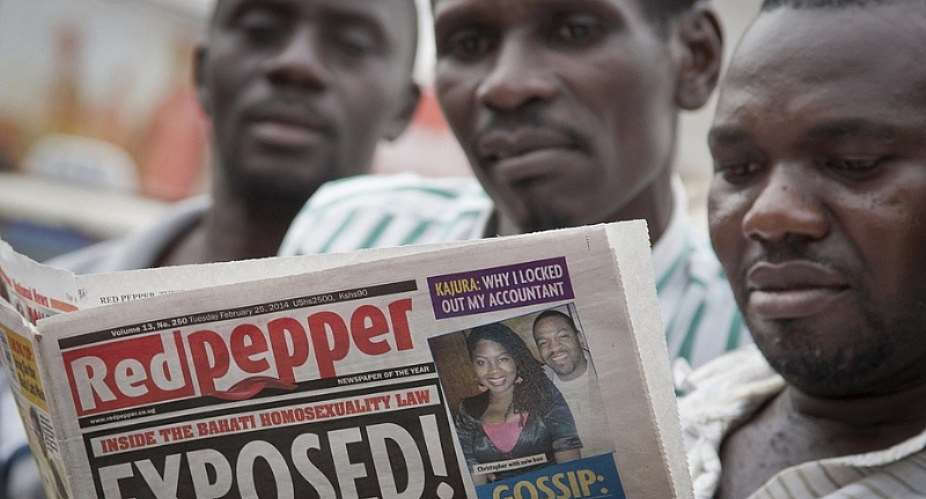Modern media practice was introduced to Africa by colonial masters. The first printing press in Uganda was inaugurated by Alexander MacKay, a British Missionary, in first decade of the twentieth century. Soon, Roman Catholics followed suit. The machines, initially for an emerging book industry to serve the burgeoning education sector, were a precursor for the print media industry-magazines and eventually newspapers.
In 1905, the first news publication, known as Mengo Notice, was started. It was followed by Agafa mu Buganda in 1906. Both these publications belonged to the Anglican Church and by extension to the Buganda kingdom whose leadership was mainly Anglican.
In 1911, the Catholic Church unveiled a monthly Luganda newspaper, Munno. The publication firm expanded into an English edition but it didn’t last long. Apparently Indian migrant workers, now a large community in Uganda needed their own voice, named The Herald in English. They in 1912 used it to assert for their civil liberties.
The pioneer papers would face unfriendly restrictions from the colonial government in the run to World War I of 1914. After the war, reforms were introduced in all sectors, opening out for numerous publications. Munno, the most influential newspaper, became targeted by colonial masters fearing it would incite dissention to ‘disrupt’ peace and development. An official policy was evolved to make all media channels controlled by government.
Aware of the might of the pen, colonialists resisted a vibrant media that could be turned into a mobilization tool against them. Indeed, citizens who first agitated for self-control used the media.
On June 26, 1956, the editor of a vernacular weekly, Anthony Tamale, 38, was fined £50 in a Kampala court for publishing materials considered to be seditious. The newspaper was called Gambuuze (“Ask Me of News”). Stating the case for prosecution, G.A. Anderson, a colonial police detective, quoted specific paragraphs of Gambuuze’s edition of June 8, 1956 thus: “the people of Uganda should unite to clamor for self-government and if we are to die then we shall die until we are exterminated…if we unite and work together we shall govern ourselves now. Political parties should not bite one another; all of us should strive for self-governance…Foreigners pack up and go! [1] Pronouncing the verdict, presiding colonial magistrate Mr. L.P. Saldanha said the editor’s calm and good character had impressed him, but he would be failing in his duty to ignore the fact that a newspaper was so powerful and influential. He thus fined the editor. Such incidents occasioned the beginning of an alliance between politics and media organizations in Uganda.
On June 3, 1958, a Buganda minister of finance A.K. Sempa and an ex-editor of Munnansi Joseph Nambale were summoned in Kampala by magistrate N.R Wylie. Also invited was Buganda Minister for Natural Resources Leonard Basudde. Both ministers were accused as joint owners of the newspaper for an article and picture published in Munnansi on May 1, 1959 under the heading: “Blood, Blood, Blood...” Prosecution adduced that the perpetuators intended to bring the colonial government into hatred and contempt as well as promoting ill will against the Uganda Police. The newspaper had written that the colonial police had hit an activist’s head till it oozed blood.
When Andrew Cohen, the last colonial governor, first launched Radio Uganda in 1954, he observed that without a radio, Uganda had been like a dumb politician in an election. He emphasized the role of media as solely being to ‘publicize’ official government positions. That media under government would enable it survive by winning elections. He did not see the role of Radio Uganda beyond ensuring the government’s survival. For long after independence, Cohen’s views remained the guiding principle to successive regimes in Uganda.
Swaib K Nsereko
Lecturer in Mass Communication Dept, Islamic University in Uganda/National Coordinator, Moral Reform Movement (MRM)
Email: [email protected]





 SSNIT must be managed without gov’t interference – Austin Gamey
SSNIT must be managed without gov’t interference – Austin Gamey
 Ejisu by-election could go either way between NPP and independent candidate — Gl...
Ejisu by-election could go either way between NPP and independent candidate — Gl...
 We never asked ministers, DCEs to bring NPP apparatchiks for returning officer r...
We never asked ministers, DCEs to bring NPP apparatchiks for returning officer r...
 No one denigrated the commission when you appointed NDC sympathizers during your...
No one denigrated the commission when you appointed NDC sympathizers during your...
 Used cloth dealers protests over delayed Kumasi Central Market project
Used cloth dealers protests over delayed Kumasi Central Market project
 A/R: Kwadaso onion market traders refuse to relocate to new site
A/R: Kwadaso onion market traders refuse to relocate to new site
 Dumsor: Corn mill operators at Kaneshie market face financial crisis
Dumsor: Corn mill operators at Kaneshie market face financial crisis
 Jamestown fishermen seek support over destruction of canoes by Tuesday's heavy d...
Jamestown fishermen seek support over destruction of canoes by Tuesday's heavy d...
 Election 2024: EC to commence voter registration exercise on May 7
Election 2024: EC to commence voter registration exercise on May 7
 Public schools rebranding: We’re switching to blue and white, we’re painting all...
Public schools rebranding: We’re switching to blue and white, we’re painting all...
